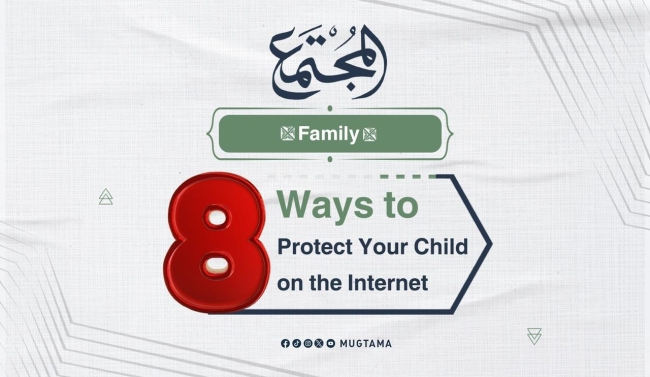Parents often resort to letting their child browse the internet freely, thinking it will keep the child occupied or believing it to be an inevitable requirement of the modern age. However, educational and psychological experts warn against the dangers children may face online, such as cyberbullying, digital harassment, racism, and hate, all within a virtual world often devoid of ethics and values. This makes it essential for parents to seek “safe internet” options.
The maxim, “Prevention is better than cure,” offers a practical solution to mitigate the negative impacts of internet use on young children. This goal can be achieved through various approaches, including parental monitoring—sometimes remotely—to build trust between you and your child without making them feel as though their privacy is being invaded.
Safe internet usage means evaluating and improving your online behavior, protecting yourself, securing your personal information, and avoiding suspicious sites, links, inappropriate content, and posts offensive to religions or people, as well as other violations that may lead to legal repercussions.
- Educate Children on Protecting Personal Information
Experts recommend that children be educated on how to safeguard their personal information, avoiding sharing details such as their home address or phone number. They should also learn to protect family photos and data, decline friend requests from strangers, avoid downloading suspicious files, and steer clear of links from unknown sources.
- Instill Religious Awareness in Children
Educational studies show that enhancing a child's religious consciousness serves as an essential shield against internet addiction, a growing concern among adolescents and youth. Parents should, therefore, emphasize Allah's awareness of our actions, reminding children that Allah is aware of everything they do and that He hears and sees all. As Allah says, “And We have already created man and know what his soul whispers to him, and We are closer to him than [his] jugular vein” (Qaf: 16)
- Enable Family Supervision with Digital Tools
It’s important to activate family monitoring through available digital tools and applications that allow parents to monitor their children’s online interactions and the content they receive or view. These tools enable parents to review contact lists, private messages, and even restrict who can send friend requests to their children. Parents can intervene if necessary by blocking, advising, or using rewards and consequences.
- Set Up Your Child's Social Media Accounts
When setting up a child’s social media account, especially if they are under 13, it’s preferable for parents to create the account themselves, manage privacy settings, and use safe apps like “Messenger Kids,” which allows children to chat only with family and friends. Parents can also report suspicious or inappropriate content and block users from interacting with the child. Additionally, parents can set a time limit for the app's usage.
- Use Safe Apps Like “Safes” for Monitoring
Parents can receive reports on their child’s online activity using secure applications such as “Safes,” which provides options to monitor internet usage, block inappropriate content, and even temporarily pause the child’s device. However, since teenagers might try to bypass these tools, parents need to stay updated on the latest technology to monitor effectively.
- Set Limits on Internet Time
It’s essential to control the amount of time children spend online, helping them prioritize activities like memorizing Quran, performing daily prayers, studying, and completing school assignments. Parents should allocate specific times for entertainment and browsing, making sure it’s not right before bed, and keeping health and safety guidelines in mind.
- Guide Children on Online Etiquette
Direct your child to adhere to online etiquette, avoid using offensive language, sharing prohibited images or videos, spreading rumors, sharing false news, or a content that harms a person, a race or a religion. Islam teaches us to avoid harming others, as the Prophet Muhammad (peace be upon him) said, “There should neither be harming (of others without cause), nor reciprocating harm (between two parties).” (Reported by Ahmad and Ibn Majah)
- Warn Against Wasting Time
Warn children against excessive time spent in the virtual world, neglecting prayer, remembrance of Allah, and beneficial learning and actions, including family ties and other responsibilities. It’s important for the whole family to uphold these principles, with parents setting a good example, and reminding the children regularly.
-------------------------------------------------------------


